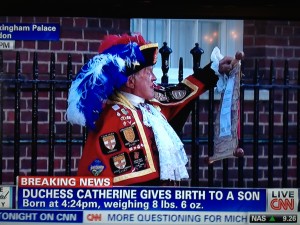A town crier announces the birth of the Prince of Cambridge
This statement was delivered a few minutes ago by Kensington Palace:
“Her Royal Highness The Duchess of Cambridge was safely delivered of a son at 4.24pm.
The baby weighs 8lbs 6oz.
The Duke of Cambridge was present for the birth.
The Queen, The Duke of Edinburgh, The Prince of Wales, The Duchess of Cornwall, Prince Harry and members of both families have been informed and are delighted with the news.
Her Royal Highness and her child are both doing well and will remain in hospital overnight.”
The news was also announced on an old-fashioned piece of paper, as demanded by royal custom and history to retain “the theatre” expected of any royal occasion. A piece of cream-colored A4-sized Buckingham Palace letterhead, signed by the doctors who assisted the Duchess during the labor and birth, was mounted on a royal easel that last proclaimed the birth of this little boy’s father just over 31 years ago, and it proclaimed:
“Her Royal Highness the Duchess of Cambridge was safely delivered of a son at 4.24pm today. Her Royal Highness and her child are both doing well.”
Long live the future King of England!
Update: July 24, 2013: His Royal Highness now has a name — three, in fact. He will be christened George Alexander Louis. And he will be known officially, at least for the time being, as His Royal Highness Prince George of Cambridge.


An article in (I think) the FT has pointed out that the choice of ‘George’ as the prince’s first name is a good one, since if Scotland becomes independent next year or at some time in the future as a separate realm of the present monarchy, and if Prince George opts to become King George VII (he could opt for a different name as King, of course), he will be King George VII of both Scotland and England (and Wales and N Ireland); whereas if he — or indeed if Prince Charles or Prince William — adopts a name as King which has been used by a Scottish King before the Act of Union (such as James), he will get into trouble with the number: cf. James II of England and VII of Scotland. Which prompts another query: why do we almost always say “Queen [or King] of England” when we ought to say “of the United Kingdom” (“of Britain” would be no better as it omits Northern Ireland)? And that’s leaving aside the other point, that the Queen is Queen of Australia, Canada, Barbados, the Solomon Islands, St Lucia, etc. etc. — 16 fully independent countries in all!